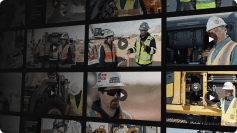Pitfalls of Project Leaders
Written by Jason Schroeder
January 16, 2022
The role of the superintendent is critical to the success of any construction project. Your customers know that if your superintendent's not in control, your team’s not going to perform the job well.
No matter how good your foremen or your workers are, without the strong leadership of a competent and careful superintendent, your project is destined for trouble. The superintendent provides the project stability that is so important to completing the work on time and within budget.
Avoiding the pitfalls.
Schroeder can name the major pitfalls of project leaders off the top of his head. “Superintendents don't win:
- When they fail to delegate,
- When they fail to build their team,
- When they fail to utilize technology,
- When they don't have a personal organization system,
- When they won't speak up, and
- When they won't hold people accountable.”
“The best thing that you can do to build and create superintendents,” according to Schroeder, “is to let them be foremen, field engineers, and project engineers.”
Taking on these roles will give future superintendents the opportunity to gain the skills and experience they’ll need to avoid the pitfalls listed above.
“If a foreman goes directly from a foreman to a super, or you go directly from college to a super, when are they going to learn AutoCAD? When are they going to learn Civil 3D? When are they going to learn Revit? When are they going to be forced to learn things like Bluebeam and all of these technology systems? When are they going to be forced to learn personal organization systems? When are they going to be forced to, like, communicate and actually piece things together and to visualize things on a coordinate geometry system?”
Schroeder’s concern is that if a superintendent doesn’t learn these key things — including how to build teams, how to use technology, and how to hold people accountable — they won’t progress in their own roles. They’ll get stuck, rather than advancing to project super, general super, or field director.
Building strong superintendents.
“You can't avoid the hard things. You can't avoid it,” says Schroeder. “And you will do yourself a favor if you pause and learn those key techniques, because those are universally the downfalls of superintendents when they don't learn them.”
One of Schroeder’s favorite books, Construction Surveying and Layout: A Step-By-Step Field Engineering Methods Manual, by Wesley Crawford, supports Schroeder’s belief that, if you want to build effective superintendents, you first build field engineers.
Mastering the field engineering fundamentals includes learning:
- How to create a personal organization system
- How to communicate
- How to prepare
- How to be disciplined
- How to start using block lettering
- How to keep a to-do list
…essentially, how to prepare to be a superintendent. Schroeder believes studying this material will give you the ability to perform at a higher level in your dirt world work.
Takeaways.
To be successful as a superintendent, says Schroeder, you must avoid the common pitfalls. You have to delegate. You have to effectively communicate your plans and schedules. You have to build your team and you have to hold the line.
Schroeder returns to a theme he holds dear: “You’re never going to create stability without accountability. You're never going to create stability without speaking up.” And he believes you are good enough and smart enough to learn the technological systems that you need to know.
If you care about your career, invest the time it takes to learn the field engineering fundamentals.
As Schroeder says, when you don’t, these pitfalls “become the major deficiencies of a superintendent and their ability to progress at work and at home. And, from a personal standpoint, then we cease to live as remarkable a life as we possibly can. We hold ourselves back and I don't want that. So please make sure you're learning and reading about and implementing the fundamentals and staying away from those deficiencies.”














